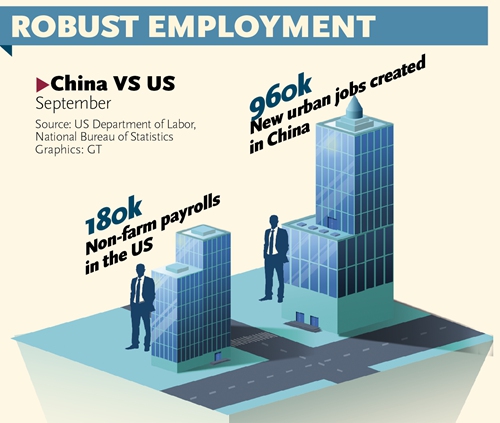HOME >> SOURCE
Tertiary industries create more jobs in China, despite trade war
By Zhang Dan Source:Global Times Published: 2019/12/2 23:43:40

Graphics: GT
Though China has witnessed slow economic growth amid the China-US trade war, it has stabilized its job market thanks to the country's tertiary industries, which have created more positions during the country's industrial upgrading efforts.
The country' s steady employment situation refutes claims by US President Donald Trump that China had lost 3 million jobs due to the trade war. Experts gave credit to the country's industrial upgrading and the appearance of new forms of flexible employment, saying the stable job market shows the resilience of China's economy.
Companies in tertiary sectors told the Global Times that they had created millions of new job opportunities over recent years, and they have great demand for professional talent in IT, procurement, operations and services to support development in the future.
Industry reports showed that live-streaming, a new industry rising amid the fast development of the country's internet sector, has generated a total of 4 million new jobs for the country; the food delivery industry has generated over 20 million job opportunities in both direct and indirect forms - some of which haven't yet been factored into the official National Bureau of Statistics (NBS) figures.
"Under the downward pressure on the economy, one of the main factors necessary to maintaining the stable job market is the function of tertiary industries as a reservoir of employment," said NBS spokesperson Mao Shengyong, noting that tertiary industries cover a broad spectrum, with a growing number of enterprises.
Around 55 percent of employed people worked in tertiary industries in China, NBS said on November 20.
More and more Chinese graduates hope to work in tertiary industries, in companies such as those working with cutting-edge technology or the internet.
23-year-old postgraduate student Zhang Yali is looking for a job in the internet industry in Beijing. Majoring in journalism and communications, she would prefer a product-operations or user-operations position in an internet company.
Having commenced her job hunt in August, Zhang has applied for eight jobs in large Chinese internet companies such as tech conglomerate Tencent and ride-hailing services provider Didi Chuxing.
"Even though Chinese internet companies had mass layoffs at the end of last year, I still want to enter this industry because it is a driving force for economic development and working in this industry will be promising," Zhang said. She knows the work will be challenging and require staying up late, but the industry will enable her to catch up with the pace of China's economic restructuring.
In the first 10 months of the year, China created 11.93 million new urban jobs across the country, meeting 2019's annual target of more than 11 million new urban jobs in advance of the deadline. The unemployment rate in urban areas dropped 0.1 percentage points to 5.1 percent in October, mainly due to the improving employment status of graduates, NBS said.
Li Chang'an, a professor at the University of International Business and Economics in Beijing, said that the improving employment absorption capacity in the services industry had effectively resolved employment difficulties in secondary industries.